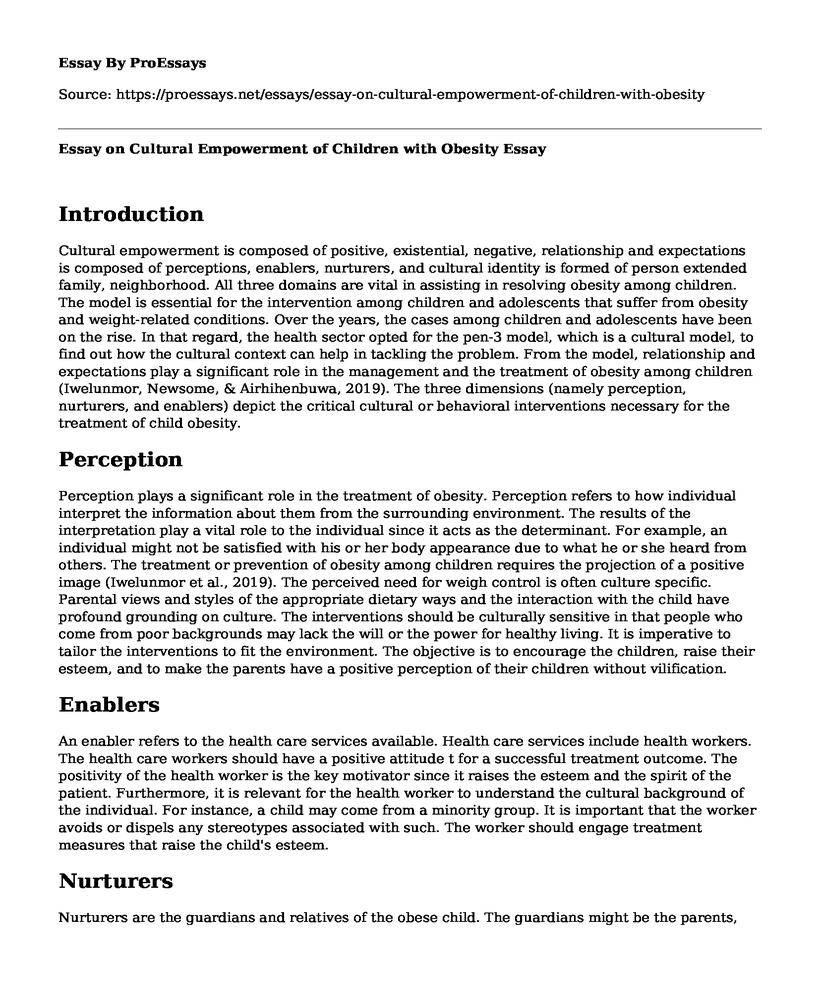Introduction
Cultural empowerment is composed of positive, existential, negative, relationship and expectations is composed of perceptions, enablers, nurturers, and cultural identity is formed of person extended family, neighborhood. All three domains are vital in assisting in resolving obesity among children. The model is essential for the intervention among children and adolescents that suffer from obesity and weight-related conditions. Over the years, the cases among children and adolescents have been on the rise. In that regard, the health sector opted for the pen-3 model, which is a cultural model, to find out how the cultural context can help in tackling the problem. From the model, relationship and expectations play a significant role in the management and the treatment of obesity among children (Iwelunmor, Newsome, & Airhihenbuwa, 2019). The three dimensions (namely perception, nurturers, and enablers) depict the critical cultural or behavioral interventions necessary for the treatment of child obesity.
Perception
Perception plays a significant role in the treatment of obesity. Perception refers to how individual interpret the information about them from the surrounding environment. The results of the interpretation play a vital role to the individual since it acts as the determinant. For example, an individual might not be satisfied with his or her body appearance due to what he or she heard from others. The treatment or prevention of obesity among children requires the projection of a positive image (Iwelunmor et al., 2019). The perceived need for weigh control is often culture specific. Parental views and styles of the appropriate dietary ways and the interaction with the child have profound grounding on culture. The interventions should be culturally sensitive in that people who come from poor backgrounds may lack the will or the power for healthy living. It is imperative to tailor the interventions to fit the environment. The objective is to encourage the children, raise their esteem, and to make the parents have a positive perception of their children without vilification.
Enablers
An enabler refers to the health care services available. Health care services include health workers. The health care workers should have a positive attitude t for a successful treatment outcome. The positivity of the health worker is the key motivator since it raises the esteem and the spirit of the patient. Furthermore, it is relevant for the health worker to understand the cultural background of the individual. For instance, a child may come from a minority group. It is important that the worker avoids or dispels any stereotypes associated with such. The worker should engage treatment measures that raise the child's esteem.
Nurturers
Nurturers are the guardians and relatives of the obese child. The guardians might be the parents, aunties, or even siblings responsible for the individual. Their roles, such as dietary practices contribute to the successful treatment of obesity and overweight (Lofton, 2019). It is relevant for the guardians to change on the nutritional practices that lead to unhealthy lifestyles. Additionally, the nurturers should be aware of what is happening to the children, especially those who are at adolescent period. By being involved will help when it comes to advising on the relevant ways to tackle the problem concerning their self-esteem.
Conclusion
Cultural empowerment plays an essential role in the treatment of obesity and weight loss among children and adolescents. Perception, nurturers, and enablers play an important role in the prevention and management of obesity among children. The children should have a positive image about their bodies. Such is possible when the care providers and parents remain positive about the body image of the child. The positive body image coupled with good dietary and medical interventions will certainly restore the health of an obese child.
Reference
Iwelunmor, J., Newsome, V., & Airhihenbuwa, C. (2014). Framing the impact of culture on health: a systematic review of the PEN-3 cultural model and its application in public health research and interventions. Ethnicity & health, 19(1), 20-46. Retrieved from https://www.ncbi.nlm.nih.gov/pubmed/24266638
Lofton, S., (2019). Using the PEN-3 Model to Explore Cultural Factors that Influence Food Choice for African-American Youth. ABNF Journal, 30(1). Retrieved from http://search.ebscohost.com/login.aspx?direct=true&profile=ehost&scope=site&authtype=crawler&jrnl=10467041&AN=135227105&h=AWQ3RVuWNpy5%2B25o2uvHJxOQjBBO4eM%2Bai4eN2AURhD92e1Q20Lt2lUW9NNfPLN2o8hRSYTjt0DXKal1MMH1ZA%3D%3D&crl=c
Cite this page
Essay on Cultural Empowerment of Children with Obesity. (2022, Mar 23). Retrieved from https://proessays.net/essays/essay-on-cultural-empowerment-of-children-with-obesity
If you are the original author of this essay and no longer wish to have it published on the ProEssays website, please click below to request its removal:
- Curriculum for the Study of American Sign Language
- Immigration and Tolerance Essay
- Reasons Why Health Promotion, Community Health, and Prevention Are Important
- Research Paper on Integration of Immigrants in the United States
- Essay Example on Gender & Family Life: Exploring Masculinity and Racial Practices
- Essay Example on Migrant Stories: Hispanic Immigration to Texas 1900-1930
- Paper Example on Airline Flight 1420: NTSB Report, Causes & Recommendations







